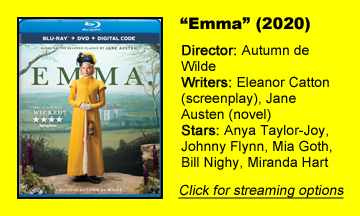I’m not the target audience for “Emma,” but given how good Anya Taylor-Joy is in everything – most recently, TV’s “The Queen’s Gambit” – I figured if she can’t hook me on this Jane Austen classic, nobody can. Well, actually, I am an admirer of “Clueless” (1995), but probably more for the modernized aspects than the core elements.
Vintage yet bizarre
It goes without saying that “Emma” nails the early 19th century English countryside, costumes, manors and manners; nothing bigger than a community theater play can get away with imperfection on those grounds when doing a period piece. But the music interludes, which sound like Irish folk staples, are jarring.
The scant score encourages us to focus on the characters rather than the general beauty – although, especially in the early going, the narrative is derailed by its goofy humor. (Note Bill Nighy’s Mr. Woodhouse ordering servants to bring barriers against an imagined draft of air; apparently blankets hadn’t been invented yet.)
Although I find director Autumn de Wilde’s “Emma” easier to watch than, say, “The Favourite” – 2018’s full-of-itself Oscar-bait period comedy – it does feel like it’s for insiders.
I couldn’t keep the characters straight in the beginning, partly because they dress and behave with similar properness.
Austen’s work is about the absurdities of English manners but also about the little quirks that set people apart, and as I looked for these, I liked the film more.
Harriet is a highlight
In “Clueless,” everyone is allowed to have big personalities, and Brittany Murphy’s made-over Tai is a particular blast, but “Emma” is of course more subtle. Still, Harriet (Mia Goth) – from whom Tai is derived — is a highlight.
Taylor-Joy’s Emma is a matchmaker, not a self-centered schemer like the trailer suggests, but – having not experienced love herself – she initially gives bad advice to Harriet.
This slightly frayed but still tight friendship is the film’s heart, but there’s also room for Mr. Knightley (Johnny Flynn) to gradually make an impression as a relative-via-marriage who has eyes for Emma. (As in “Clueless,” the fact that they’re part of the same family is understated, but not enough to not make it weird.)
Taylor-Joy doesn’t get a lot of help from the screenplay by Eleanor Catton. She’s asked to convey a lot of Emma’s arc internally, and that’s why you want an actress of Taylor-Joy’s quality.
I sense that Emma initially thinks she’s above the idea of love, but also fears she has put other people’s love matches first for too long at her own expense. And there’s also the wrinkle of her desire to take care of her widowed father.
I don’t think Taylor-Joy is bad – and in this talky film (where she doesn’t make much of an attempt at an accent) I especially noticed how her voice sounds like Sarah Michelle Gellar’s – but I wanted more standout moments. She’s not nearly as magnetic as in “The Queen’s Gambit,” and among Emma-ish roles, I prefer Alicia Silverstone’s “Clueless” turn.

A strange pivotal moment
The pivotal moment for Emma is strange: She accidentally makes a too-mean joke at the expense of spinster Miss Bates (Miranda Hart) and feels terrible about it.
I think we’re supposed to think it’s the culmination of Emma’s bad behavior, but I had gotten the impression that she generally means well; she’s not out to use people for her own amusement. (It’s not an issue of Taylor-Joy always reading as a nice girl; see “Thoroughbreds” to discard that notion.) This seems like a case where Emma should apologize, but not necessarily a life-altering lesson.
“Emma” doesn’t rise above the showiness of the costumes; the fact that it’s 2 hours and 4 minutes long and leisurely paced doesn’t help. It feels directionless outside of the obvious direction of a matchmaker eventually finding her own match.
I suppose a talented young actress like Taylor-Joy needs to check a core period-piece role off her list before she goes deeper into her career, but otherwise I’m not sure why we needed another adaptation.


